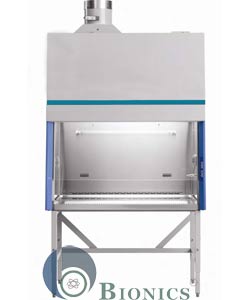Why You Need to Know About Class 2 Biosafety Cabinets?
Why You Need to Know About Class 2 Biosafety Cabinets?
Blog Article
Class 2 Biosafety Cabinets – Vital for Lab Safety and Biological Containment

In today’s scientific and clinical labs, safety for personnel and samples is non-negotiable. Whether it's biotech development, pharmaceutical research, or microbiological analysis, biosafety cabinets form the backbone of contamination control.
Of all types, Class 2 cabinets are most commonly used due to their efficiency and versatility. These units are crucial for working with moderate-risk organisms and sensitive samples.
Understanding Biosafety Cabinets
Biosafety cabinets are airflow-controlled workspaces engineered for microbiological safety. They use HEPA filtration to remove contaminants from incoming and outgoing air.
These units are generally classified into three main types: Class I, II, and III based on containment level. Among these, Class II units strike a balance between user, product, and environmental protection.
Why Class II Cabinets Are the Preferred Choice in Labs
Class 2 Biosafety Cabinets offer simultaneous protection for people, processes, and surroundings. They generate a vertical airflow that reduces turbulence and contamination.
Air is treated using dual filtration systems to ensure safe circulation and exhaust. These cabinets are ideal for work involving moderate-risk pathogens (BSL-2/3).
Key Features of Microbiological Safety Cabinets
A Class 2 microbiological safety cabinet includes several advanced features such as:
• HEPA/ULPA filtration to trap microbes and particles
• Laminar airflow that minimises disruption and contamination
• Negative pressure barriers to prevent leakage
• Optional UV lights for overnight sterilisation
• Low sound emissions to reduce fatigue
• Clear front panel for visibility and safety
These Class 2 Biosafety Cabinets elements support lab workers in maintaining sterile working environments.
Where Class 2 Cabinets Are Used
Class 2 Biosafety Cabinets are widely deployed in clinical labs, vaccine R&D, and academic research. They are indispensable for handling clinical specimens, blood cultures, and biological reagents.
From universities to private pathology labs, Class 2 cabinets ensure lab hygiene and sample integrity.
Why Laboratories Prefer Class II Safety Cabinets
Using Class 2 cabinets offers numerous benefits for safety, accuracy, and lab hygiene:
• Protects the integrity of lab work
• Shields operators from harmful aerosols and pathogens
• Ensures filtered air is safe for release or recirculation
These cabinets support biosafety goals while improving lab productivity.
Regulatory Standards for Class 2 Cabinets
Top manufacturers design units compliant with major biosafety regulations worldwide. Class 2 units are sub-classified as A1, A2, B1, and B2—each with distinct airflow and exhaust features.
• Type A2: Ideal for general-purpose labs
• Type B2: Used for hazardous vapors and chemicals
Matching the cabinet type to your process is essential.
Choosing the Right Biosafety Cabinet
Before purchasing, consider:
• The biosafety level required (BSL-1, BSL-2, or BSL-3)
• Cabinet dimensions, ducting needs, and room layout
• Ease of use, energy efficiency, and upkeep
• Service network and part availability
Working with reliable manufacturers provides peace of mind and technical guidance.
Best Practices for Using Class II Biosafety Cabinets
For optimal results:
• Minimise airflow interference during operation
• Schedule regular performance checks
• Ensure operators follow best practices
Operational best practices include:
• Maintain biosafety gear protocols
• Work calmly to prevent airflow disturbances
• Wipe work areas with disinfectants regularly
• Use UV lights only when cabinet is off and unoccupied
Why Class 2 Cabinets Are a Must-Have in Labs
Class 2 biosafety cabinets are essential for labs that value safety, precision, and cleanliness. They ensure contamination-free experiments and personnel safety.
From clinical research to vaccine development, Class II cabinets support world-class laboratory practices. When investing in a biosafety cabinet, opt for trusted brands that offer end-to-end service—because safe science starts with smart containment. Report this page